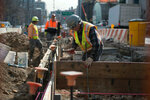A few of our stories and columns are now in front of the paywall. We at The Chief-Leader remain committed to independent reporting on labor and civil service. It's been our mission since 1897. You can have a hand in ensuring that our reporting remains relevant in the decades to come. Consider supporting The Chief, which you can do for as little as $3.20 a month.


Real estate developers would be required to pay prevailing wages to construction workers employed on city projects that have large public subsidies, according to legislation being pushed by members of the City Council.
The Fair Share Act, introduced last week by Council Member Kevin Riley, who chairs the Council’s Subcommittee on Zoning and Franchises, would establish a prevailing-wage requirement — salary and benefits equal to those paid in the locality to workers in the same trade or occupation — on projects receiving more than a $1 million in funding from the city or a city-affiliated economic development entity.
Construction spending across the city is expected to reach $87 billion in 2023, while government investment in construction will total an estimated $23.6 billion this year, according to the New York Building Congress.
In a recent City & State op-ed, Riley explained that he introduced the legislation because he believes “the people actually building these projects, the ones whose taxes are partially paying for the subsidies in the first place, should receive a fair wage and benefits package — they should get their Fair Share.”
Riley argued that construction jobs used to be “a guaranteed ticket to the middle class.”
“Using these wage requirements forges a pathway to the middle class and benefits the overall economy. Although similar laws exist, exemptions for construction workers have turned what was once a pathway to the middle class into another low-wage paying job,” he wrote.
He cited data from a study by the Center for Labor Research at the University of California, Berkeley, that found that 41 percent of construction workers were dependent on some type of government assistance, while a quarter of construction workers did not have health insurance.
Although the average annual salary for construction workers was $91,543 last year, nearly three-quarters of construction workers made less than $80,000 a year, according to the State Comptroller’s office. And the 56 percent of construction workers who do not have a college degree earned an average salary of just $48,300 in 2019, Comptroller Tom DiNapoli found.
Immigrants, who advocate groups such as the New York Committee for Occupational Safety and Health say are the most susceptible to get hurt on the job and to be paid low wages, make up 53 percent of workers in the industry.
“This measure … is all about ensuring that as our city prospers, so do our hardworking individuals who pour their sweat into building its future,” Riley said in introducing the bill during the Oct. 5 press event ahead of that afternoon’s Council meeting. “When we guarantee fair compensation, we are strengthening our communities, reducing income disparities and creating a more stable and thriving local economy.”
He added that the legislation would improve retention among the construction workforce. The number of New Yorkers working in the construction industry dropped sharply during the pandemic, but has since rebounded. There were 157,500 people employed in the construction industry in New York City as of July 2023, DiNapoli’s office found.
The bill has received bipartisan support from more than two dozen Council members, including Carmen De La Rosa, who chairs the labor committee, and Sandy Nurse, who previously worked as a carpenter.
The New York City District Council of Carpenters, which represents about 20,000 carpenters, dock builders and other tradespeople, also backs the legislation. “A prevailing wage ensures that our hardworking brothers and sisters in the construction industry are fairly compensated and can afford to live in the city they help build,” the union stated in a social-media post.
clewis@thechiefleader.com
We depend on the support of readers like you to help keep our publication strong and independent. Join us.
Comments
No comments on this item Please log in to comment by clicking here